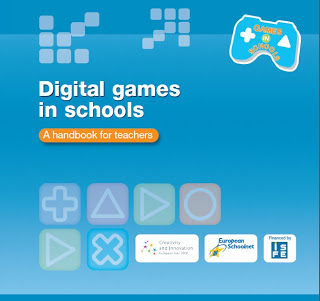Learn English
Playing is an important part of human development and life. We learn by doing, socializing exchanging ideas and collaborating with our peers. However, we grow up and all of a sudden ? voilà ? school appears and playing takes a back seat. What has happened? Teaching, understood as instruction, does not consider it relevant for learning.
Videogames play an important role in children and teens? life. What we call 'technology', they call it 'life'. Therefore, why not gamify our language class? Do you need more reasons for it?
Autonomous learners.
Motivating for students.
Emotional engagement.
Situated learning, social learning, students become the centre of attention.


- 15+ Great Quizzes In English
Question-all-student: Games in English? What for? Know-all-teacher: In order to learn English, without effort, while you have fun. Question-all-student: I played games when I was 5, now I?m 20 and I don?t feel like playing anymore. Know-all-teacher:...
- The Beneficial Effects Of Games On Language Learning
Games can help to learn a foreign language (The beneficial effects of games on language learning) Games have long been used in foreign language teaching but some teachers and students may still view them with suspicion. They may think that games are just...
- Web 2.0 Tools For Esl/efl Teaching
Nowadays, our students are digital natives, that is, "children who were born into and raised in the digital world", children who spend a lot of time surfing on the net, chatting with their friends, playing computer games... This is not learning, but what...
- Infinitely Digital
I like when different areas of my life collide - as they did a week or so ago in Bethnal Green Working Men's club, watching four young performance poets do a show about computer games (part of the London Games Festival) It was funny and intelligent...
- Learn English Through Games And Make Your Learning Fun!
There are a variety of wonderful games out there that have been developed to help people of all ages to learn the English language. You?ll find games that focus on reading, others that focus on vocabulary, some that focus on listening, and a whole lot...
Learn English
Digital Games: Learning English by Playing
?Games are a more natural way to learn than traditional classrooms. Not only have humans been learning by playing games since the beginning of our species, but intelligent animals as well? (Clark Aldrich, Learning Online with Games, Simulations and Virtual Worlds, 2009).
Playing is an important part of human development and life. We learn by doing, socializing exchanging ideas and collaborating with our peers. However, we grow up and all of a sudden ? voilà ? school appears and playing takes a back seat. What has happened? Teaching, understood as instruction, does not consider it relevant for learning.
However, in spite of this negative picture, there is still hope as ICT is changing the way we perceive games and particularly videogames. They are becoming to be considered powerful and valuable tools for learning.
Digital games are...
Good for learning, developing strategies and skills to solve problems in context and critical thinking.Autonomous learners.
Motivating for students.
Emotional engagement.
Situated learning, social learning, students become the centre of attention.
As part of European Schoolnet's project 'Digital Games in Schools. A Teacher's Handbook' was published in 2009. The handbook is intended for those teachers interested in introducing digital games in their teaching practice. Therefore, it provides useful information about the benefits of digital games for learning as well as tips on how to use them as educational and motivational resources.

The handbook will be very helpful as an overview of this issue. Nevertheless, if you wish to explore the possibilities of videogames for second/foreign language learning, I recommend you to visit Graham Stanley and Kyle Mawer'blog Digital Play. The blog is really easy to navigate and offers a wide range of activities and lesson plans based on digital games to accomplish different language learning objectives while having fun.
In the following video, Graham Stanley talks about the ways gamification can be used in the English classroom and shares some ideas for adapting games for language teaching. If you want to have access to the full version, click here.
In the following video, Graham Stanley talks about the ways gamification can be used in the English classroom and shares some ideas for adapting games for language teaching. If you want to have access to the full version, click here.
An interesting educational digital game which will be launched next summer is Wikiduca. This is the project of two creative Spanish young minds, David Anthony and Anton Popovine, who decided to work on this educational browser-game to help children learn English vocabulary through videogames.

Starting from the idea that children love video games, fantasy worlds and solving mysteries, David and Anton propose exciting quests and minigames for them. As children increase their vocabulary words, they gain more powers and new missions within the game. The key point is "learning by playing".
Wikieduca is basically based on a business freemium model, that is, most of the content will be free except a small part of extras. You can read this news in Spanish.
Via: Online Colleges Guide
For further reading:
- Why Children Should Play More? by Scott Steinberg
- How Can a Digital Game for Learning Be Defined? by Patricia Felicia
- Language Teaching and Learning. Online Digital Games and Gamification by Graham Stanley
- Using Interactive Fiction for Digital Game-Based Language Learning by Joe Pereira.
- Six Computer Games to Use in an English Language Classroom by Lindsay Clandfield.
Other websites where you can find useful digital games for your classes:

- Playfic: an online community for writing and playing interactive fiction.
- Games for change: learning games to change the world.
- Inanimate Alice: a digital novel which includes teachers' resources.
- Charles Dickens Life and Victorian London
- A detective story.

- 15+ Great Quizzes In English
Question-all-student: Games in English? What for? Know-all-teacher: In order to learn English, without effort, while you have fun. Question-all-student: I played games when I was 5, now I?m 20 and I don?t feel like playing anymore. Know-all-teacher:...
- The Beneficial Effects Of Games On Language Learning
Games can help to learn a foreign language (The beneficial effects of games on language learning) Games have long been used in foreign language teaching but some teachers and students may still view them with suspicion. They may think that games are just...
- Web 2.0 Tools For Esl/efl Teaching
Nowadays, our students are digital natives, that is, "children who were born into and raised in the digital world", children who spend a lot of time surfing on the net, chatting with their friends, playing computer games... This is not learning, but what...
- Infinitely Digital
I like when different areas of my life collide - as they did a week or so ago in Bethnal Green Working Men's club, watching four young performance poets do a show about computer games (part of the London Games Festival) It was funny and intelligent...
- Learn English Through Games And Make Your Learning Fun!
There are a variety of wonderful games out there that have been developed to help people of all ages to learn the English language. You?ll find games that focus on reading, others that focus on vocabulary, some that focus on listening, and a whole lot...
